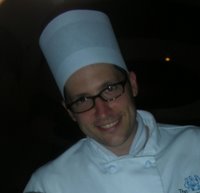LIFE REALLY IS LIKE HIGH SCHOOL...
 I'm enrolled at the French Culinary Institute (FCI) in a 10-month program called Classic Culinary Arts 1. It's a 600 hour program, three nights a week, Monday, Wednesday, and Friday from 5:45 p.m. to 10:45 p.m. The school has a restaurant called L'Ecole (French for 'the school') where eventually, higher-level students cook quality, reasonably-priced prix-fixe meals for the public.
I'm enrolled at the French Culinary Institute (FCI) in a 10-month program called Classic Culinary Arts 1. It's a 600 hour program, three nights a week, Monday, Wednesday, and Friday from 5:45 p.m. to 10:45 p.m. The school has a restaurant called L'Ecole (French for 'the school') where eventually, higher-level students cook quality, reasonably-priced prix-fixe meals for the public.The 10 month program is broken down into 4 different levels. Here's how the FCI website describes them:
Level I, Basic Techniques of Cooking
From the very first day of your culinary education, you will be cooking - in chef's uniform - learning, hands on, the fundamental skills and techniques required for great cuisine. You'll be doing knifework; learning to work in a brigade (team) to accomplish complex tasks quickly; studying and preparing various cuts of meat, fowl, seafood and vegetables; making stocks and sauces; understanding seasoning; creating five classic pâtes; three classic appareils; and five classic crèmes. You'll also learn all about food storage, and a level of organization and cleanliness that will be welcomed in any commercial kitchen, anywhere.
Level 2, Intermediate
Now, with the basic skills in place, you'll use them until they are second nature, as you begin cooking for others-the chef's meal. Every day, you'll be cooking from one of the five departments of the kitchen: garde-manger, fish, meat, pastry, or staff meal. Teamwork becomes all-important; you discover how to work with creativity, efficiency and elegance in meeting daily deadlines. Responding to your Chef-Instructor or Chef de Partie. You learn the elements of menu planning and presentation, pairing tastes and colors, raw and cooked foods. Here, too, you start to recognize the details that set the standard and execute them carefully and consistently.
Level 3 & 4, Advanced Restaurant Service
Level 3 is where mastery begins for all students in L'Ecole's kitchen setting, as you rotate through the garde-manger (appetizers, salads, and other cold dishes) , poissonier (fish), saucier (sauces and some meat dishes involving sauce), and patissier (pastry) stations, and also work in entremetier (dishes accompanying the main dish). Speed, accuracy, consistency, and teamwork become paramount.
As your taste and eye become more developed, you will learn to prepare a special daily restaurant menu. With the creation of your new dish, you'll be responsible for preparing a chronology sheet, recipe ingredients, cooking procedures, and plating requirements. Ultimately, at Level IV, you will be working as Chef de Partie, and part of the team assuming responsibility for the daily menu at L'Ecole.
You'll not only prepare foods using all the cooking methods you've learned, you'll learn to adapt these classic techniques to create contemporary dishes. Adaptability, flexibility, and grace under fire will count as much as mastery of cooking. Ultimately, you'll plan and complete a creative project that will allow you to express all your individuality and mastery and set the tone for your career. You'll be amazed at what you can do. Creatively. Efficiently. And well. Upon graduation, you'll be ready to work competently in the finest commercial kitchens.
The disadvantage of the program I've chosen is that I won't get the intensive instruction on bread-making. I'm going to have to do something to compensate for that. I'm also considering taking some wine classes outside of school once I've graduated.
 In Level 1 we were in a kitchen on the second floor (left), removed from the restaurant kitchen. Each class-night we would go downstairs to the Level 2 kitchen (where I am currently) to get the dinner prepared by students for students, instructors and dishwashers alike. The Level 2 kitchen is attached to the school's restaurant kitchen but still separate. We can see the Level 3 & 4 kitchen area and we interact with the students in those levels but in a way, it really is like high school all over again. We're still sophomores who haven't passed the midterm which allows us to cook for the restaurant kitchen and some of the upper level students haven't been shy about showing us their general disapproval. Hopefully that will change once we move into the Level 3 kitchens.
In Level 1 we were in a kitchen on the second floor (left), removed from the restaurant kitchen. Each class-night we would go downstairs to the Level 2 kitchen (where I am currently) to get the dinner prepared by students for students, instructors and dishwashers alike. The Level 2 kitchen is attached to the school's restaurant kitchen but still separate. We can see the Level 3 & 4 kitchen area and we interact with the students in those levels but in a way, it really is like high school all over again. We're still sophomores who haven't passed the midterm which allows us to cook for the restaurant kitchen and some of the upper level students haven't been shy about showing us their general disapproval. Hopefully that will change once we move into the Level 3 kitchens.





0 Comments:
Post a Comment
<< Home